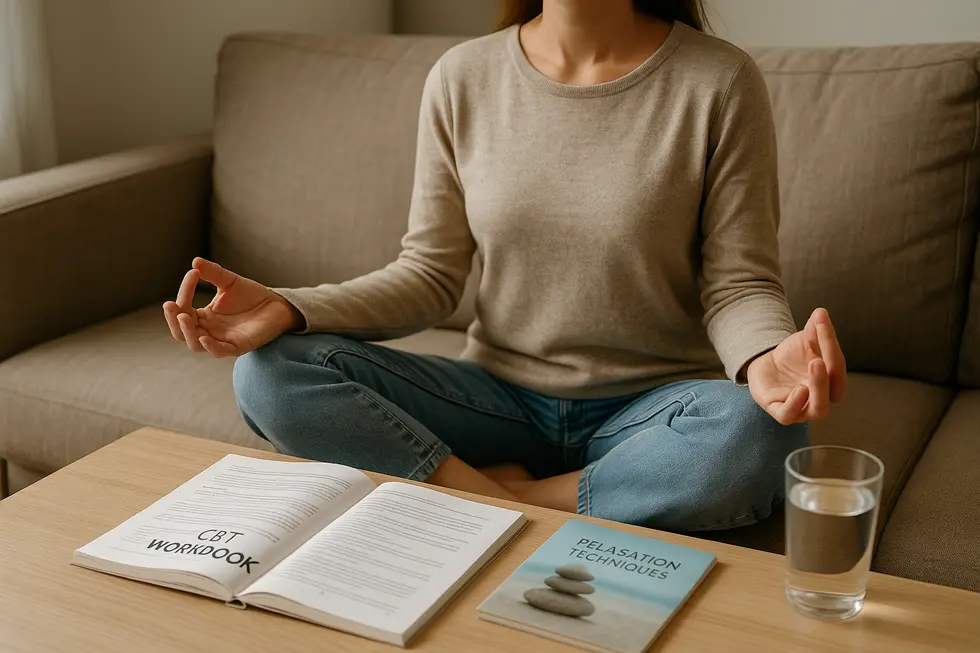Managing Anxiety: Effective Treatment Options and Self-Care Strategies
This article is for informational purposes only and has been reviewed by licensed pharmacists. Always consult with a healthcare professional before starting any medication.
Understanding Anxiety Management Options
Anxiety affects millions of people in the UK, impacting quality of life and daily functioning. Understanding the range of available treatments—from clinical interventions to self-management techniques—empowers individuals to make informed decisions about their mental health. This comprehensive guide explores both therapeutic approaches like Cognitive Behavioural Therapy (CBT) and medication options alongside practical lifestyle modifications that can significantly reduce anxiety symptoms. Whether you’re considering professional treatment or looking to enhance your self-care routine, this article provides evidence-based information to help navigate anxiety management effectively. Remember that while these strategies can be beneficial, they should complement rather than replace guidance from qualified healthcare professionals.
Table of Contents
Quick Summary
Anxiety affects millions of people in the UK, impacting quality of life and daily functioning. Understanding the range of available treatments—from clinical interventions to self-management techniques…
Comprehensive Strategies for Managing Anxiety

1. Antidepressants and Anxiety: Navigating Pharmaceutical Interventions
When confronting anxiety, the utilisation of antidepressants often emerges as a vital component of a broader treatment strategy. Antidepressants, particularly Selective Serotonin Reuptake Inhibitors (SSRIs) and Serotonin-Norepinephrine Reuptake Inhibitors (SNRIs), are frequently prescribed to manage anxiety disorders. These medications operate by modulating neurotransmitter levels in the brain, which can help stabilise mood and anxiety symptoms. According to NICE guidelines, SSRIs such as sertraline and fluoxetine are often considered first-line treatments due to their favourable side effect profiles. However, it is crucial to consult your pharmacist and healthcare provider to determine the most appropriate medication, as individual responses can vary significantly.
It’s important to acknowledge potential side effects like nausea, insomnia, and sexual dysfunction that may arise with antidepressant use. The MHRA advises monitoring these effects closely, especially at the initiation of treatment or during dosage changes. During pregnancy or breastfeeding, the decision to use antidepressants should involve careful evaluation of risks and benefits, emphasised by GPhC standards.
Integrating antidepressants into an anxiety management regimen should be accompanied by lifestyle adjustments and therapeutic techniques such as Cognitive Behavioural Therapy (CBT), which can further enhance outcomes. For those exploring different treatment pathways, understanding the comparison between medications and therapies can be enlightening. Read more about this complex interplay here. As per NHS recommendations, regular follow-ups with healthcare professionals are essential to ensure optimal treatment efficacy and safety. Should any concerning symptoms arise, seeking medical advice promptly remains imperative.
2. Analyzing the Place of Antidepressants in Anxiety Relief
In tackling anxiety, particularly when therapeutic approaches like Cognitive Behavioural Therapy (CBT) prove insufficient on their own, antidepressants offer another layer of potential relief. The NHS advises these pharmacological aids, primarily selective serotonin reuptake inhibitors (SSRIs), as suitable for managing anxiety disorders. They work by increasing serotonin levels in the brain, which helps to modulate mood and alleviate anxiety.
However, it’s essential to recognise that antidepressants are not a one-size-fits-all solution. Their effectiveness varies significantly between individuals, with some experiencing notable benefits, while others may encounter negligible effects. As per NICE guidelines, a typical therapeutic trial of antidepressants should last at least 6 to 8 weeks to adequately assess their impact. During this period, it’s crucial for patients to remain in close contact with healthcare professionals to monitor side effects and make necessary dosage adjustments as prescribed.
The MHRA advises caution when prescribing antidepressants, especially in younger populations, owing to the potential risk of increased suicidal thoughts. For those who are pregnant or breastfeeding, seeking medical advice is imperative, as some medications can affect both mother and child.
While antidepressants can substantially mitigate anxiety symptoms, integrating them with lifestyle changes—like those highlighted in our guide on Generalised Anxiety Disorder Treatment—often yields the best outcomes. This dual approach addresses both the neurological aspects of anxiety and empowers individuals to regain control through effective self-management techniques.
Understanding and Managing Anxiety: A Guide on Treatment and Self-Management

1. Decoding the Impact of Cognitive Behavioral Therapy in Anxiety Control
Cognitive Behavioral Therapy (CBT) stands as a pillar in anxiety management due to its structured and goal-oriented approach. CBT operates on the principle that our thoughts, feelings, and behaviours are interconnected. By modifying maladaptive thought patterns, CBT helps reduce anxiety symptoms. This therapeutic method involves identifying negative thought cycles and challenging them through evidence-based strategies.
CBT encourages individuals to engage in activities they might avoid due to anxiety, gradually exposing them to anxiety-inducing situations to diminish their fears over time—an essential component known as exposure therapy. Techniques like cognitive restructuring enable patients to gain a more balanced perspective on anxiety-provoking scenarios, enhancing their coping mechanisms. Through regular practice, individuals can experience a substantial decrease in anxiety symptoms, bolstering their overall mental health.
According to NICE guidelines, CBT is highly recommended for treating anxiety disorders, including generalised anxiety disorder, panic disorder, and PTSD. While some may experience mild discomfort as they confront their fears, the benefits often outweigh these temporary side effects. However, like any therapeutic intervention, it might not be suitable for everyone, and its efficacy can vary based on individual differences. Therefore, it is advisable to consult with a professional to determine if CBT aligns with one’s personal therapy goals. For those interested in more insights into the comparison between CBT and medications, exploring the resources on CBT vs Anxiety Medication can be beneficial.
2. The Dynamics of Altering Thought Patterns with CBT in Anxiety Relief
Cognitive Behavioural Therapy (CBT) stands at the forefront of non-pharmacological treatments for anxiety due to its structured approach that addresses the cognitive and behavioural aspects of the disorder. The core mechanism of CBT lies in guiding individuals to identify and subsequently alter distorted thinking patterns that can exacerbate anxiety symptoms. This therapeutic method fosters awareness of how thoughts influence emotions and behaviours, thereby equipping individuals with the tools to challenge and change maladaptive thought processes.
At the heart of CBT is the concept of cognitive restructuring, a process that involves recognising automatic thoughts—those ingrained responses triggered by specific situations—and reassessing their validity. By encouraging patients to critically evaluate these cognitions, CBT empowers them to replace negative beliefs with more realistic and balanced thoughts. According to NICE guidelines, CBT not only reduces anxiety symptoms but also enhances coping strategies, providing long-term benefits even after treatment sessions conclude.
Furthermore, behavioural experiments play a crucial role in CBT, allowing individuals to test their beliefs against reality and collect evidence to counter fear-inducing thoughts. This practical approach underscores the significance of experiential learning in modifying behaviour. Although CBT can be highly effective, the involvement of a trained therapist is crucial, particularly for those with complex or severe anxiety disorders. As per NHS recommendations, ongoing monitoring and support from healthcare professionals can optimise outcomes over time.
For a detailed comparison between CBT and medication in anxiety management, I recommend exploring CBT vs Anxiety Medication.
Exploring the Impact of Cognitive Behavioral Therapy on Anxiety Management

1. Educational Insights into Identifying and Managing Anxiety Triggers
Understanding and managing anxiety effectively require not only therapeutic interventions but also an in-depth educational approach to identifying anxiety triggers. Recognising these triggers is crucial as they vary significantly between individuals, often comprising specific events, environments, or even internal thought processes that elicit an anxious response.
Educating oneself on the nuances of these triggers can vastly improve symptom management. This involves analysing personal experiences and patterns that precede anxiety episodes. By keeping a journal or using digital tools to log events and emotional responses, individuals can discern a clearer picture of what sets off their anxiety. Such practices align with Cognitive Behavioral Therapy (CBT) principles, which focus on recognising and altering negative thinking patterns. Understanding triggers through this educational lens empowers individuals to preemptively mitigate anxiety responses by engaging in coping strategies discussed in CBT sessions.
Moreover, healthcare professionals encourage the use of educational resources and workshops to bolster this understanding. Attending support groups or seminars can offer new perspectives and shared experiences, fostering a community that collectively navigates the complex landscape of anxiety management. As per NHS recommendations, adopting a knowledgeable approach towards one’s condition by recognising personal symptoms and triggers is a proactive step in anxiety management, complementing clinical treatments.
For those incorporating lifestyle adjustments, the blog on naturally alleviating anxiety with self-care explores self-help techniques that can be integrated alongside formal therapies, enhancing resilience against recognised triggers.
2. Decoding the Roots: An Educational Dive into Anxiety Triggers
In the intricate dance of managing anxiety, understanding triggers is pivotal in orchestrating effective self-help strategies. Anxiety triggers are the events or situations that activate anxiety symptoms in individuals, and deciphering them often involves a blend of introspection and external guidance. Armed with this insight, self-help techniques can be tailored to specifically counteract these triggers, offering a significant boost to mental well-being.
One of the primary self-help strategies is mindfulness and meditation, which fosters a heightened awareness of the present, effectively countering the runaway thoughts that often accompany anxiety. By engaging in focused breathing and guided imagery, meditation creates a mental space where anxiety finds less room to thrive.
Alongside mental techniques, deep breathing exercises stand as a cornerstone of anxiety management. Scientifically, deep breathing activates the body’s parasympathetic nervous system, commonly referred to as the “rest and digest” mode, which naturally mitigates the stress response triggered by anxiety.
Physical activity is another powerful ally. Regular exercise secretes endorphins, the natural chemicals in the brain that act as mood enhancers and stress relievers, ultimately lifting the veil of anxiety. Coupled with journaling, where individuals document their thoughts and feelings, these approaches encourage a proactive stance in identifying and managing personal anxiety triggers.
Additionally, adjusting routines and reducing stimulants like caffeine can prevent exacerbating anxiety source. Establishing a predictable daily schedule arms individuals with a comforting framework that mitigates the unpredictability stressors that often spur anxiety.
Ultimately, the journey through self-help techniques in managing anxiety hinges on understanding and addressing triggers, crafting a personalised armoury against anxiety’s oft-unpredictable onslaught.
Exploring the Impact of Cognitive Behavioral Therapy on Anxiety Management

1. Educational Insights into Identifying and Managing Anxiety Triggers
Understanding and managing anxiety effectively require not only therapeutic interventions but also an in-depth educational approach to identifying anxiety triggers. Recognising these triggers is crucial as they vary significantly between individuals, often comprising specific events, environments, or even internal thought processes that elicit an anxious response.
Educating oneself on the nuances of these triggers can vastly improve symptom management. This involves analysing personal experiences and patterns that precede anxiety episodes. By keeping a journal or using digital tools to log events and emotional responses, individuals can discern a clearer picture of what sets off their anxiety. Such practices align with Cognitive Behavioral Therapy (CBT) principles, which focus on recognising and altering negative thinking patterns. Understanding triggers through this educational lens empowers individuals to preemptively mitigate anxiety responses by engaging in coping strategies discussed in CBT sessions.
Moreover, healthcare professionals encourage the use of educational resources and workshops to bolster this understanding. Attending support groups or seminars can offer new perspectives and shared experiences, fostering a community that collectively navigates the complex landscape of anxiety management. As per NHS recommendations, adopting a knowledgeable approach towards one’s condition by recognising personal symptoms and triggers is a proactive step in anxiety management, complementing clinical treatments.
For those incorporating lifestyle adjustments, the blog on naturally alleviating anxiety with self-care explores self-help techniques that can be integrated alongside formal therapies, enhancing resilience against recognised triggers.
2. Decoding the Roots: An Educational Dive into Anxiety Triggers
In the intricate dance of managing anxiety, understanding triggers is pivotal in orchestrating effective self-help strategies. Anxiety triggers are the events or situations that activate anxiety symptoms in individuals, and deciphering them often involves a blend of introspection and external guidance. Armed with this insight, self-help techniques can be tailored to specifically counteract these triggers, offering a significant boost to mental well-being.
One of the primary self-help strategies is mindfulness and meditation, which fosters a heightened awareness of the present, effectively countering the runaway thoughts that often accompany anxiety. By engaging in focused breathing and guided imagery, meditation creates a mental space where anxiety finds less room to thrive.
Alongside mental techniques, deep breathing exercises stand as a cornerstone of anxiety management. Scientifically, deep breathing activates the body’s parasympathetic nervous system, commonly referred to as the “rest and digest” mode, which naturally mitigates the stress response triggered by anxiety.
Physical activity is another powerful ally. Regular exercise secretes endorphins, the natural chemicals in the brain that act as mood enhancers and stress relievers, ultimately lifting the veil of anxiety. Coupled with journaling, where individuals document their thoughts and feelings, these approaches encourage a proactive stance in identifying and managing personal anxiety triggers.
Additionally, adjusting routines and reducing stimulants like caffeine can prevent exacerbating anxiety source. Establishing a predictable daily schedule arms individuals with a comforting framework that mitigates the unpredictability stressors that often spur anxiety.
Ultimately, the journey through self-help techniques in managing anxiety hinges on understanding and addressing triggers, crafting a personalised armoury against anxiety’s oft-unpredictable onslaught.
Understanding ‘Managing Anxiety With Treatment and Without’ through Cognitive Behavioural Approaches

1. Integrating Therapy with Lifestyle Choices for Holistic Anxiety Management
In tackling anxiety, a multifaceted approach that combines therapeutic techniques and lifestyle adjustments yields significant benefits. Cognitive Behavioural Therapy (CBT) serves as an anchor for changing unhelpful patterns of thought and behaviour. However, integrating this with non-therapeutic strategies creates a more comprehensive method for managing anxiety.
Lifestyle changes such as regular physical activity, for instance, can complement therapeutic interventions. Exercise is not only beneficial for physical health but also for mental clarity and emotional stability. The NHS recommends 150 minutes of moderate aerobic exercise weekly, which has been shown to reduce symptoms of anxiety and promote well-being. Moreover, mindfulness practices and relaxation techniques like yoga and meditation are growing in popularity as effective non-pharmacological treatments.
In addition to lifestyle modifications, a balanced diet plays a crucial role. Consuming foods rich in omega-3 fatty acids and complex carbohydrates can support neurotransmitter function, potentially easing anxiety symptoms. The synergy between therapeutic interventions and these daily lifestyle practices can significantly enhance the quality of life for those managing anxiety.
According to NICE guidelines, such a combination not only addresses the physical and psychological aspects of anxiety but also empowers individuals with greater control over their mental health. This blend of strategies offers a holistic approach to managing anxiety. For more details on non-medical strategies, you may want to explore our guide on self-care and anxiety. As always, consult your pharmacist or healthcare provider before starting any new treatment plan, especially if you’re pregnant, breastfeeding, or managing pre-existing conditions.
2. Integrating Therapy and Lifestyle Approaches for Comprehensive Anxiety Relief
Managing anxiety effectively often requires a collaborative approach that blends both therapeutic and non-therapeutic strategies. Cognitive Behavioural Therapy (CBT), a widely endorsed method backed by research and the NHS guidelines, stands at the forefront of psychological interventions for anxiety management. CBT works by reshaping negative thought patterns and maladaptive behaviours, offering patients a toolkit for long-term mental resilience.
Beyond the confines of the therapist’s office, lifestyle modifications play a pivotal role in anxiety management. Regular physical activity, as advised by healthcare professionals, has been shown to reduce stress levels significantly and improve mood. Mindfulness and relaxation techniques, such as yoga and meditation, complement therapeutic sessions by fostering an environment of calm and awareness.
The integration of these elements offers a holistic framework not just for symptom management but for building a foundation of lasting well-being. Dietary changes, such as reducing caffeine intake and prioritising nutrient-rich foods, support mental health by stabilising mood swings and promoting better sleep. Accessing self-care is vital, and individuals should feel empowered to explore practices that personally resonate with their needs.
However, while these approaches are beneficial, they must be tailored to individual circumstances. As per NICE guidelines, any anxiety management plan should involve medical oversight, especially for those on pharmacological treatments like SSRIs or benzodiazepines. Equally, consulting with healthcare providers, including pharmacists, to understand potential contraindications and necessary lifestyle adjustments is crucial. Seek medical advice if symptoms persist or worsen, ensuring all interventions remain safe and effective.
Bringing It All Together
Managing anxiety effectively often involves a thoughtful combination of professional treatment and personal self-management strategies. While therapeutic approaches like Cognitive Behavioural Therapy provide structured frameworks for addressing unhelpful thought patterns and behaviours, complementary lifestyle modifications—including regular physical activity, balanced nutrition, and stress management techniques—create a supportive foundation for mental wellbeing. For those with more severe anxiety, carefully prescribed medication may play an important role as part of a comprehensive treatment plan. What’s most significant is that anxiety management is highly individualised; strategies that work well for one person may be less effective for another. By understanding your unique anxiety triggers and responses, you can work with healthcare professionals to develop a personalised approach that addresses your specific needs. Remember that seeking help is a sign of strength, and with appropriate support and consistent practice of effective strategies, significant improvement in anxiety symptoms is achievable.
About Quick Meds UK
We’re the UK’s modern online pharmacy making healthcare simple. From prescriptions to health advice, we provide everything you need to manage your health from home. Fast delivery, great prices, real pharmacists. Order from Quick Meds UK today.
Need Professional Advice?
Our licensed pharmacists are available for consultations
Book a Consultation